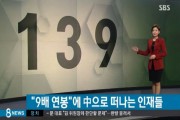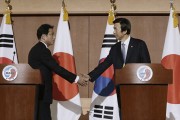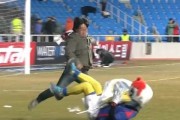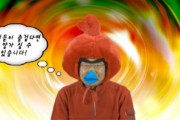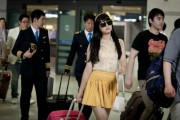From Daum:
Intensifying competition and an absence of social cooperation exhaust and anger Koreans
Behind the spectacular economic growth of South Korea lies the growing toll on society.
After the Asian Financial crisis, the corporations’ balance sheets have become healthier than ever before. The proportion of GDP produced by top-ten corporations grew from 55.1% in 2008 (564 trillion Won/ USD) to 75.6% in 2010. Indeed, fierce internal and external competition since the crisis has produced robust firms. However, behind this success story lies an untold human and social cost. Perpetual structural adjustment, expansion of temporary employment, encroachment against small/medium firms by large firms have led to the attrition of the Korean middle-class. The international competitiveness table has made the people’s lives unstable and uncertain.
The sadness of temporary workers
Mr. Kim (36) tried for the Administrative Official Exam and the 7th Grade Public Officials Exam, thinking it was a relatively impartial competition. But he gave up eventually after 4 years and the temporary teaching position he held at the private academic institute became his ‘career’. He taught in a small after-school academic institute for middle and high-school students, and during the entrance exam period taught additional essay-writing classes. Working as a private instructor and salesperson at a large supermarket, his income hovered between 700,000-800,000 Won ($700-800 USD).
Having never signed an employment contract, he worked on and off for 11 years. He applied for temporary teachings position at middle and high-schoosl but no demand existed. He had a short break in 2010, filling in for a sick-leave position as a substitute teacher. His position was entirely contingent upon the duration of the person’s sick-leave. He left 2 weeks short of 6 months, the minimum period required for unemployment benefit eligibility.
13 years after graduation from university, other than his 10,000,000 Won ($10,000 USD) key-money deposit, he has no other asset. Try as he might, he was unable to break out of his temporary employment status and is now resigned to his fate. He ruefully reflected on what he missed, but he ‘has accepted that he will never be a permanent employee anywhere.’
‘Competing against the large corporation’ – the life of failed small business owner
Mr. Lim (52) started a small supermarket in Gyeonggi-do Goyang-si after the collapse of his company during the 1997 Financial Crisis. In addition to his own 10,000,000 won ($10,000 USD), he had to borrow from his friends and relatives. His luck began to wane after two super-sized marts started business nearby. He tried to stay afloat by slashing prices, but a crushing blow dealt by another ‘super supermarket’ opened up across from his store, the addition of a 24/7 convenience store and six other small stores was simply beyond him. His landlord asked him to vacate the premise recently.
‘I have not been able to attend any of my parents’ birthdays and never took a day off for the last 16 years, but all I have left is debt worth 50,000,000 won ($50,000 USD),’ says Mr. Lim. He is dismissive of the talk of ‘mutual-supportive existence’, ‘symbiotic growth’ promoted by South Korean politicians as blatant lies.
Restructuring ‘family-like colleagues’
Mr. Ban Ki-ryong (51) worked as a KT Customers Services department manager in Chungbook, but nowadays he is on nine different kind of drugs since his retirement three years ago due to severe depression. Although he survived the cuts, he was in charge of carrying out the restructuring.
‘According to the C-grade Player scheme, I managed those with sub-par performance,’ Mr. Ban says. ‘With the set-quota to fill, I had to monitor and report on every single little detail of the workers under my watch, including how often they were late, how often they came back late from lunch, whether they had any issues with the customers on a monthly basis. We drilled them every quarter with exams. And just because you did well on the exam did not mean you were saved.’
One of his ‘restructurees’ was from his alma mater, 7 years his junior. ‘I suffered personally, and he and I became bitter enemies. In my alumni circle, I am labeled as a scumbag.’ After his graduation from Chungjoo University in 1984, he entered KT which was known for its family-like atmosphere and more popular than Samsung back then. But after privatization, the sole virtue was ‘competition’ and ‘mutual-elimination,’ and no longer ‘mutual-support.’
A society where corporations prosper and people die
According to the Korea Employment Information Service, the number of ‘restructurees’ bounced back to about 103,000, edging close to IMF crisis peak of 126,000. The ‘perpetual’ restructuring regime has meant that those who are laid off are crowding the labor market, with over 1 in 3 fallen into the condition of temporary employment. This is the model of ‘advanced’ management practice trumpeted by the labor-market reformer of the 2000s. However, those with temporary employment earn only 58% of the full-time employment with constant threat of unemployment hovering over their heads.
Opening small business has become just as difficult. In 2008, 33.9% of the working population run a small business, double that of the OECD average of 15.8%, and they are very likely to face stiff competition from large conglomerates crowding into the retail business. The growing opening of the domestic market to global competition and domestic privatisation has exposed everyone from CEO to elementary school to unlimited global competition. Young students focus on their CV and specs, while those ahead cannot relax from the constant pressure to be ‘one step ahead.’ In this age of competition there is no winner.
Comments from Daum:
insight:
Others’ failure = my happiness
아주 좋은 날:
If you wanted to change this situation, you should have voted! The implementation of neoliberal policies was the result of blinding support for the ruling Saenuri party, and we have supported them over and over again in election. And now you complain about how they do not understand your pain? The only conceivable change that could be wrought is through high voter-turnout but I am sure not a lot of you will turn out at the booth and then turn around and complain about it for the next five years.
와닷:
This is really because of 2MB~ The rich gets richer and the poor gets poorer. Conglomerate-centered policy is the problem in South Korea.
바룸:
If you eliminate any of the E-Marts, Home Plus and Lotte Marts, Main Street business will boom. They are sucking dry the main street economy by their quasi-monopolistic grip on everything they sell, and that leads to decrease in personal income, depressing in domestic economy. Even if there is contraction in domestic consumption, large retailers could squeeze on medium and small businesses to maintain their profit margin. We have to recognise that they are behind our collective pain.
마그누스:
Living is so hard now. I cannot save a dime and all social occasions drain all my savings. My heart chokes every time. Money chokes me and this society chokes me and all the politicians choke me. Thanks goes to 2MB who taught me the important lesson on politics.
alclsskfk:
Hey slaves, stop bitching and get to work~~
크흥:
Why? Why do poor people vote for the rich? Why do they believe their lies all the time? Why? Why do they not know that they are being exploited? And why can’t they only complain?
의리있는놈:
This is all because of the incompetent Democrats’ fault and their shit-progressive policies. The IMF crisis made two very wrong people into presidents and it made the underclass’s life harder. Incompetent Gae Dae-joong and Noeh Mool-hyun [note: the netizen is deliberately misspelling the names of late presidents Kim Dae-jung and Roh Moo-hyun. ‘Gae’ means god in Korean and ‘Noeh’ means bribe, thus referring to the unproven charges of bribery that led to Roh’s eventual suicide in 2009].
진빈:
The true winner of this competition is foreign migrant workers and corporations… Foreign migrant workers can turn their lives around after a few years of hardship in this country and the corporations profit by driving our wages down and forcing us to compete with migrant workers….
이카루스:
Leaving home at six in the morning to go to work, my wife will follow me soon after. My kid in college, I worry about his future, and I see no way out…. This place forces me to live without any dignity.
여름수채화:
Now even the president is a slave to large corporations. Not a slave to North Korea, but to large conglomerates… We need a president with courage to heal the polarisation of the social classes. Or we face a fate worse than that of North Korea… a place without any hope.
박영철:
This country belongs to large conglomerates.. Businessmen pay off politicians and in turn those politicians side with large conglomerates… Now those conglomerates try to squeeze out small retailers out of main street. Later they buy out land and set up warehouse-style stores.
웁스람:
Fine, I take your point. Undemocratic elements have changed our society into a more competition-centered one, and the MB administration has not done such a good job of slowing it down. But let me ask you haters a question – what did Roh Moo-hyun and Kim Dae-jung do when they HAD the opportunity to reform this country, during the IMF crisis? Was that ten year not long enough for you? Blaming others is easy but they are still responsible for the opportunity-cost that they have squandered.
다우닝:
Large corporations and conglomerates live at the expense of people.. The specter of competition has actualised itself into an immovable social stratification.. And the corruption of the judiciary always works in favor of the big money. Entrenched corruption, loss of hope, and inertia – they need to be cleaned out and that is the only way we can save ourselves.
insight:
In this jungle of capitalism, the only rule worth bearing in mind is that the strong survives and the weak dies out. To knock over one’s competitor is to survive. The tears of others is nectar to me.
세잎클러버77:
Slaves ought to shut up. Who voted for the party of big money and military-service evaders, the party of Filipinos and migrant workers, the party of Gyeongsang province? Fuck it, let’s all die together, you people make my children suffer, you morons.
민주지산:
Tax breaks for the riches, increase on indirect tax… isn’t that what we voted them in for? Idiots have to pay.

